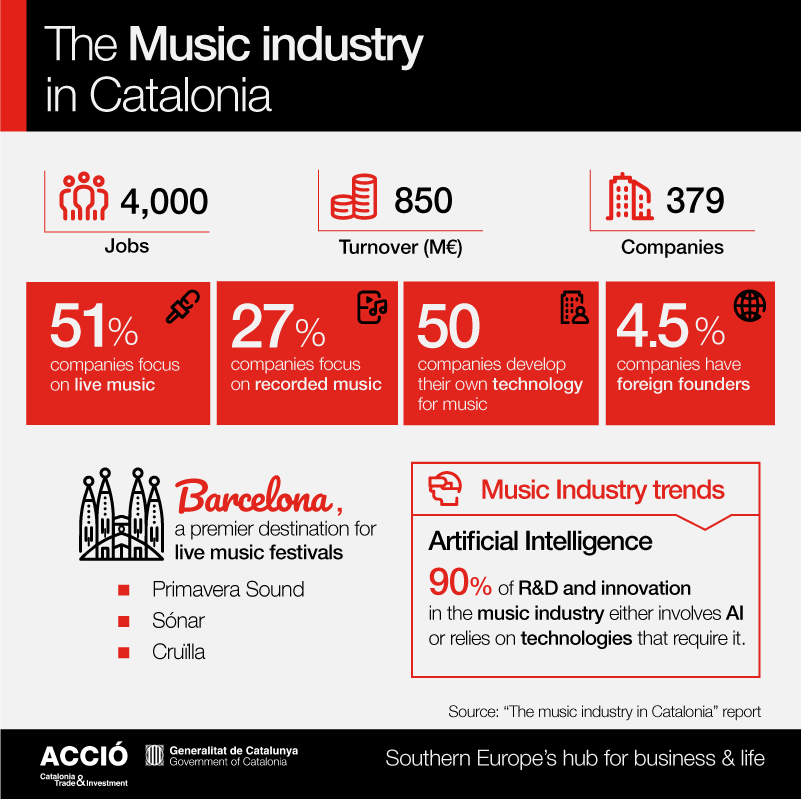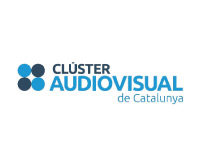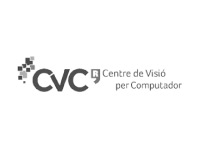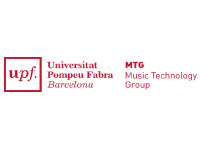“Barcelona stands out globally as being a hub capable of combining people from abroad and people from here”
Ventura Barba, CEO of Advanced Music (Sónar)
Generating 850 million euros annually in Catalonia, the music industry is made up of 379 companies, creating more than 4,000 jobs.

The Catalan music industry is made up of 379 companies generating over 4,000 jobs, highlighting the strategic importance of this sector in terms of economy, innovation, and technology for the region.
Companies in Catalonia's music sector primarily focus on live music, constituting 51% of the total number of companies and contributing to 82% of the overall revenue. Within this segment, there are businesses offering services or solutions for the organization of concerts or festivals, such as lighting services, sound equipment, stage assembly services, concert and festival promoters, concert halls and musical spaces, and event production.
Out of all companies, 27% specialize in recorded music, and they contribute 10% of the revenue. This 27% includes record labels, music publishers, and their auxiliary industry, such as companies developing digital solutions for distributing musical content, monitoring rights generation, and promoting artists. Additionally, it includes companies involved in the distribution, aggregation, and curation of musical content and music recording studios.
Finally, corporate-focused companies make up 9% of the total. These are businesses that create or distribute specific musical content for other companies, such as for advertisements, corporate events, or in-store background music.
In addition to boasting internationally recognized Catalan artists, technology holds a strategic importance in this sector. Currently, there are over 50 Catalan music tech companies, which are businesses developing proprietary technology for music. Examples include BMAT, specializing in AI for music monitoring (with over 200 employees), and Sonosuite, which has created software for digital content distribution.
Furthermore, Barcelona is currently the top startup hub in southern Europe and one of the leading tech hubs on the continent. This is a valuable asset for the region as it can help catalyze the potential growth of the music industry in Catalonia, positioning it as a global reference in the years to come. Currently, about 4.5% of companies in the Catalan music industry are foreign-owned.
One of the characteristics of the Catalan music industry is that this positioning coexists with the fact that Barcelona, the Catalan capital, has solidified its status in recent years as a premier location for live music festivals. Events like Cruïlla, Sònar, or Primavera Sound contribute to this reputation, and where 30% of the audience has, for some 30 years, always been international (originating from over 100 countries). More than half of the companies in the music sector in Catalonia are dedicated to live music, a crucial factor as it can serve as a bridge to translate technology emerging from the realm of knowledge into the market.
In fact, the knowledge and research ecosystem stands out as the differentiating asset of the music industry at an international level and has become the primary source for generating startups in Catalonia within this sector. Particularly notable is the Music Technology Group (MTG) at Pompeu Fabra University, considered the second most important in Europe in terms of size and research impact, with a technological focus on applying artificial intelligence to various areas of music. Other relevant centers include Eurecat, the Computer Vision Center (CVC), the Research Group on Media Technologies at La Salle, UPC, and the BSC-CNS, among others.
In the field of education, Catalonia offers a broad range of music-related studies with prominent training centers such as the Conservatori del Liceu, the Taller de Músics, the Escola Superior de Música de Catalunya (ESMUC), or the International Music Business (IMB) School. Currently, there are nearly 500 students enrolled in master's and bachelor's programs in this sector, while almost 3,000 individuals are enrolled in bachelor's degrees and vocational training cycles.
“Barcelona stands out globally as being a hub capable of combining people from abroad and people from here”
Ventura Barba, CEO of Advanced Music (Sónar)


379 companies

€850M turnover

4,000 jobs
One of the trends in the music industry in Catalonia and internationally is the application of artificial intelligence in the field of music. In fact, 90% of research and development (R&D) and innovation in the industry either involves artificial intelligence or relies on other technologies that require it.
In this regard, the importance of having research teams from major technology companies developing technology in this sector in Catalonia stands out. Companies such as Dolby, Amazon, Apple, and Microsoft have research teams in Catalonia. In fact, these big tech multinationals are increasingly involved in content generation and distribution. Apple Music, Amazon Music, Tencent Music, and YouTube Music, along with Spotify, comprise almost 50% of the total global music streaming subscribers. Notably, applications utilizing AI from Meta and Google, launched last year, have the capability to transform text into music through this technology.
Increasingly, major companies in the music industry are venturing into new business areas, such as record labels delving further into the realm of live music and streaming platforms incorporating segments of business related to music management and production. Tencent Music, the leading digital platform in China for music, is a notable example. It operates not only in streaming but also engages in content production, promotion, and music editing.
The role of the financial sector in the music industry is also growing through the acquisition of catalogs and live music, as musical assets are gaining increasing interest from the financial sector. In just over three years, on a global scale, the purchase of music catalogs by investment funds has exceeded $6.5 billion.
One of the global trends in the music industry is the disappearance of stages and intermediaries in the value chain thanks to the growth of digital distribution. Artists are seen to be earning more revenue from live music than recorded music, where record labels traditionally had a larger share. There is a tendency towards the elimination of intermediary figures such as managers, distributors, record labels, and rights management entities. In the future, artists are expected to rely more on their own platforms for music production and distribution.
Drawing upon Catalonia's assets and the potential of the music industry, new business opportunities emerge for companies established in Catalonia. In the case of recorded music, for instance, opportunities lie in the development of digital platforms that foster connections between musical groups and their followers. Technological solutions can streamline the creative and production processes for artists, monitor the usage and reproduction of songs across various media, and capture new musical interests among consumers.
Regarding live music, there are identified opportunities, such as the development of technological solutions that monitor audience interests and can create personalized events based on their profiles and local markets. Immersive tools that offer differential experiences to concert attendees also present opportunities. Companies in Catalonia can work towards creating recyclable or reusable products for festivals, new technological platforms that facilitate online concert tracking and can represent an additional revenue stream for promoters, technological systems that optimize queues, as well as lighting and audiovisual solutions for live musical productions.


Access our report on the music industry in Catalonia and see the latest trends in the sector.
Discover the music industry and the sector's main events in Barcelona (Catalonia).










14 Jul 2025
Video game multinational Scopely opens its new tech hub in Barcelona, employing 700 people
19 Mar 2025
WG Drones establishes new headquarters in Catalonia
29 Jan 2025
Top Trends to Watch at Barcelona’s ISE 2025
27 Jan 2025
Catalonia's Audiovisual industry grows 14% in one year, representing 3% of GDP with €8.636 billion in revenue